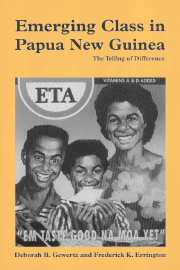Book contents
- Frontmatter
- Contents
- List of illustrations
- Acknowledgments
- Introduction: the twists and turns of difference
- 1 The middle class the (new) Melanesian way
- 2 How the grass roots became the poor
- 3 The realization of class exclusions
- 4 The hidden injuries of class
- 5 The problem(s) of the poor
- 6 Class and the definition of reasonability
- Conclusion: on dark nights of the soul
- Notes
- References
- Index
Introduction: the twists and turns of difference
Published online by Cambridge University Press: 03 December 2009
- Frontmatter
- Contents
- List of illustrations
- Acknowledgments
- Introduction: the twists and turns of difference
- 1 The middle class the (new) Melanesian way
- 2 How the grass roots became the poor
- 3 The realization of class exclusions
- 4 The hidden injuries of class
- 5 The problem(s) of the poor
- 6 Class and the definition of reasonability
- Conclusion: on dark nights of the soul
- Notes
- References
- Index
Summary
This book is our telling of the ways that class inequalities in contemporary Papua New Guinea have been convincingly, and with telling effect, told. It is about the contexts and processes, both “traditional” and “modernist,” within which many relatively affluent Papua New Guineans were conveying to whole categories of their countrymen that the latter lacked viable or legitimate claims on significant resources. It is about how it has become both possible and plausible for these relatively affluent “nationals” – even those living in rather modest urban centers like Wewak, the capital of the East Sepik Province and the fifth largest town in a Papua New Guinea of some 4 million people – to present themselves in an apparently diverse range of contexts to other Papua New Guineans (including members of their own cultural groups) as fundamentally superior.
It is about how, by 1996 – scarcely two decades after the formal end of the era in which an Australian child could address a grown “native” man as “boy” – a Papua New Guinean physician could comfortably distinguish himself from others in his cultural group by calling them “bushy” and himself “civilized”; how Papua New Guinean members of Wewak's Rotary Club could remind each other not to invite countrymen of the “wrong” sort to their annual benefit auction; how a group of Papua New Guinean businesswomen could designate themselves as models of entrepreneurial success while implicitly blaming poor women for their own continuing impoverishment; how a Papua New Guinean store owner could snap his fingers at his golf caddies so that they would move with more alacrity; how Papua New Guinean members of Wewak's golf and yacht clubs could congratulate themselves on the exclusivity of their organizations; how a Papua New Guinean politician could advise the rural poor that they should no longer aspire to the ownership of Toyota Land Cruisers — such as he, in fact, owned — but would have to content themselves with water buffaloes as the appropriate technology for their scaled-back futures; and how a Papua New Guinean national court judge could define the “ordinary” man as the well-educated, urban man.
- Type
- Chapter
- Information
- Emerging Class in Papua New GuineaThe Telling of Difference, pp. 1 - 23Publisher: Cambridge University PressPrint publication year: 1999

